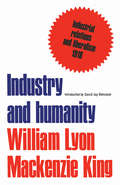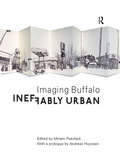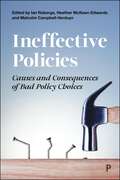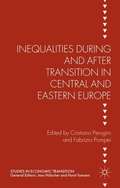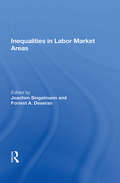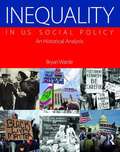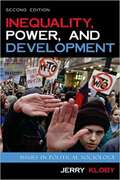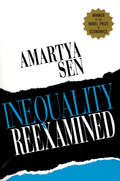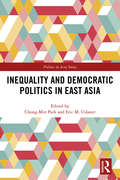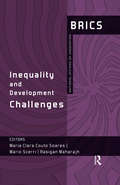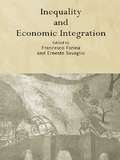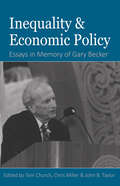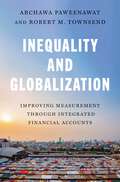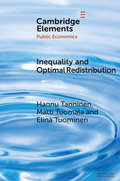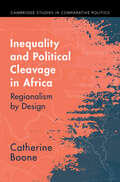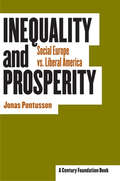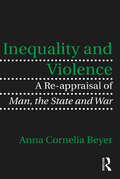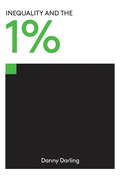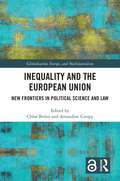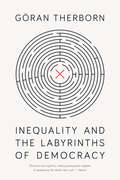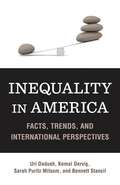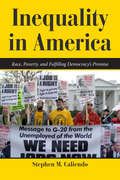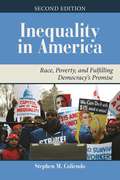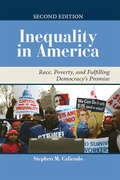- Table View
- List View
Industry and humanity: A study in the principles of industrial reconstruction
by David Bercuson William KingIndustry and Humanity was first published in 1918. In it William Lyon Mackenzie King, then a prominent public servant who had forged a respectable reputation among business leaders as an expert in labour affairs, discussed the process of national and industrial reconstruction then about to begin. The book reviewed several momentous crises in North American labour-management relations, revealed the background to various important pieces of Canadian legislation in the field of social welfare, and provided a broad rationale for the establishment of a new programme of democracy in industry. Industry and Humanity is not only a history of King's career as industrial relations expert and consultant for the Canadian government and several giant American corporations. It also contains illustrations and analogies from his urban industrial and educational experiences. He did settlement work, examined working conditions and trade unionism in his graduate studies at university, and pioneered in the federal department of labour in examining at close hand some of the most undesirable effects of industrialization. The portions of the book which were derived from King's experiences in investigation and arbitration work present an invaluable picture of deplorable working conditions and wasting away of human lives. King's analysis of strikes – their causes and social consequences – is the book's central theme and is an accurate and telling assessment of the effects of social strife on the well-being of the community. Moreover, King put flesh on the dry statistics of industrial accidents and illnesses and the testimony of countless inquiries and royal commissions with vivid descriptions of the dehumanizing effects of the modern factory system.
Ineffably Urban: Imaging Buffalo
by Miriam PaeslackBuffalo, in New York state, is 'ineffable': a typical city in transition between its past and future. It is a classic example of one of many 'shrinking cities' in North America and elsewhere which once prospered because of heavy industrialization, but which now have to deal with various degrees of urban decay. Bringing together a range of scholars from the humanities, the social sciences, art and architecture, this volume looks at both the literal city image and urban representation generated by photographs, video, historical and contemporary narratives, and grass-root initiatives. It investigates the notion of agency of media in the city and, in return, what the city’s agency is. This agency matters particularly as it is both transforming - shrinking, fading, being redefined - and being shaped through its visual and spatial mediation. While illustrated by Buffalo in particular, the book examines a broader phenomenon: the identity of those cities that were built and blossomed during the late 19th and early 20th century and are now in different stages of decline and disintegration. However, while such cities are all confronted with complex issues of economic instability, social and racial segregation, urban sprawl and shrinking processes both in the inner city and more and more in their ex-urban belts, they are too often described through dramatically simplifying visual and linguistic tropes. In Buffalo such tropes refer dialectically either to the city’s past glory or its presumed current cultural, political and economical stasis and decline. This book takes such tired, and familiar tropes and questions them.
Ineffective Policies: Causes and Consequences of Bad Policy Choices
by Ian Roberge, Heather McKeen-Edwards, and Malcolm Campbell-VerduynAvailable open access digitally under CC-BY-NC-ND licence. Bad policies have repercussions that can be felt for decades. But what makes a bad policy? And how can it be reversed or improved? Bringing together scholars from Europe and North America, this book goes beyond traditional policy theory to study bad and ineffective policies across three fields: • the environment; • the financial services sector; and • emerging technologies. Using cutting-edge research and analysis, the editors and authors state the case for studying ineffective policies, demonstrate their harmful effects across policy fields and provide policy makers with the tools to reflect, identify, and act upon them.
Inequalities During and After Transition in Central and Eastern Europe
by Cristiano Perugini Fabrizio PompeiThe book deals with the key aspects of social and economic inequalities developed during the transition of the formerly planned European economies. Particular emphasis is given to the latest years available in order to consider the effects of the global crisis started in 2008-2009.
Inequality In Labor Market Areas
by Joachim SingelmannDuring the past two decades, many attempts have been made to refocus stratification research and the study of inequality. The contributors to this volume have a long-term concern with the importance of space and locality. Many of them belonged to a research project during the early 1980s that had as one of its main aims the analysis of labor force
Inequality In US Social Policy: An Historic Analysis
by Bryan WardeIn Inequality in US Social Policy: An Historic Analysis, Bryan Warde illuminates the pervasive and powerful role that social inequality based on race and ethnicity, gender, immigration status, sexual orientation, class, and disability plays and has historically played in informing social policy. Using critical race theory and other structural oppression theoretical frameworks, this book examines social inequalities as they relate to social welfare, education, housing, employment, health care, and child welfare, immigration, and criminal justice. This book will help social work students better understand the origins of inequalities that their clients face.
Inequality Power and Development: The Task of Sociology
by Jerry KlobyThe growth of transnational corporations, the dominance of worldwide financial and political institutions, and the extensive influence of media that are nearly monopolized by corporate interests are key factors shaping our global society today. What are the consequences of these developments for the great masses of people throughout the world? One clearly emerging pattern is the growing disparity between the developed nations and the rest of the world.In this excellent analysis of power distribution and its effects, sociologist Jerry Kloby presents data on the increase of wealth and income inequality, and argues that many of the policies pursued by the developed nations and international corporations have led to a deterioration of living standards and the environment in many parts of the world. He also discusses a power shift in the United States that has weakened the working class.One of the great strengths of Kloby's work is the comprehensive picture he creates from many diverse events and trends―local and international, contemporary and historical. The many graphs and tables containing supporting data add a visual element that guides the reader to a clear understanding of the complex forces underlying contemporary developments. He also clearly explains the meaning and relevance of such sophisticated but important terms as neoliberalism, dependency, civil society, and social capital.This fully revised and updated edition will have enduring value for students and scholars of sociology, political science, economics, and international relations.
Inequality Reexamined
by Amartya SenThe noted economist and philosopher Amartya Sen argues that the dictum “all people are created equal” serves largely to deflect attention from the fact that we differ in age, gender, talents, and physical abilities as well as in material advantages and social background. He argues for concentrating on higher and more basic values: individual capabilities and freedom to achieve objectives. By concentrating on the equity and efficiency of social arrangements in promoting freedoms and capabilities of individuals, Sen adds an important new angle to arguments about such vital issues as gender inequalities, welfare policies, affirmative action, and public provision of health care and education.
Inequality and Democratic Politics in East Asia (Politics in Asia)
by Eric M. Uslaner Chong-Min ParkBringing together scholars of inequality, both inside and outside of Asia, this book examines how the distribution of income has affected political institutions, representation, and behaviour in Asia. Through detailed data analysis, the international team of contributors engages with the existing literature, arguing that the connection between inequality and political institutions is much more complex than has been suggested by previous case studies from outside the region. Instead, this book demonstrates that the micro-level evidence for the correlation between inequality and democracy is mixed and the impact of distributive politics is conditioned not only by institutional but also historical and geopolitical factors. As such, this volume suggests that the median voter theorem and simplified partisan models prove to be ineffectual in accounting for distributive politics in East Asia. Analysing history, structure and context to further understand the politics of inequality in East Asia, this book will be invaluable to students of Asian Politics, as well as inequality, democracy and political economy more widely.
Inequality and Development Challenges: BRICS National Systems of Innovation
by Mario Scerri Maria Clara Couto Soares Rasigan MaharajhThis series of books brings together results of an extensive research programme on aspects of the national systems of innovation (NSI) in the five BRICS countries — Brazil, Russia, India, China, and South Africa. It provides a comprehensive and comparative examination of the challenges and opportunities faced by these dynamic and emerging economies. In discussing the impact of innovation with respect to economic, geopolitical, socio-cultural, institutional, and technological systems, it reveals the possibilities of new development paradigms for equitable and sustainable growth. This volume analyses the co-evolution of inequality and NSI across the BRICS economies. It reveals the multi-dimensional character of inequality, in going beyond its income aspect to include assets, access to basic services, infrastructure, knowledge, race, gender, ethnicity and geographic location. In advancing valuable policy recommendations, the book argues that inequalities must be factored in development strategies given that benefits of innovation are not automatically distributed equally. Original and detailed data, together with expert analyses on wide-ranging issues, make this book an invaluable resource for researchers and scholars in economics, development studies and political science, in addition to policy-makers and development practitioners interested in the BRICS countries.
Inequality and Economic Integration (Routledge Siena Studies in Political Economy)
by Francesco Farina Ernesto SavaglioInternationally, globalization and increased economic integration has impacted quality of life and individual well-being. Attempts to evaluate the impact on income dispersion from this process have been extremely controversial. This key volume is the first real attempt to build up indices and a theoretical framework in order to deal with inequality of opportunity, and to enable social and political institutions to monitor increasing disparities in well-being and social exclusion. It thoroughly examines the possible relationships between the recent acceleration in economic integration and inequality among persons and countries and will enable social and political institutions to monitor increasing disparities in well-being and social exclusion. The contributions to this volume cover various subfields of economics, and examine both the negative and positive spillover effects of economic integration on individuals, social groups and nations. Since the impact of globalization on the most deprived people is multidimensional in nature, the theoretical framework is extended to a multivariate context where several individual characteristics are simultaneously considered. This original volume covers many important topics and features an impressive array of respected contributors. As such, it is sure to be an invaluable resource for postgraduates and professionals in the fields of political economy and economics.
Inequality and Economic Policy: Essays In Honor of Gary Becker
by Tom Church, Chris Miller, and John B. TaylorDrawing from a 2014 Hoover Institution Conference on Inequality in honor of Gary Becker, a group of distinguished contributors explore various measures of inequality in America and address the issue of whether or not it is increasing. In looking at this question and examining policy implications, the authors draw on research on human capital and intergenerational mobility. The authors suggest that the emphasis on inequality and redistribution, while not wrong, is nevertheless misplaced, for it may lead us to adopt policies that will disrupt the progress we have made while doing nothing to promote the kind of growth that is essential to national progress.
Inequality and Globalization: Improving Measurement through Integrated Financial Accounts (The Gorman Lectures in Economics #15)
by Robert M. Townsend Archawa PaweenawatA remedy for the gap between micro and macro data, making measures of inequality and national income consistent with each otherIncreasing inequality, the impact of globalization, and the disparate effects of financial regulation and innovation are extraordinarily important topics that fuel spirited policy debates. And yet the facts underlying these debates are of doubtful accuracy. In reality, as Archawa Paweenawat and Robert Townsend show in Inequality and Globalization, there is a large gap between micro household surveys, which measure key outcomes such as inequality, and aggregated financial accounts, which measure macroeconomic totals and growth. Paweenawat and Townsend propose a remedy: integrated financial accounts, in which the flows in income statements, including saving and investment, are consistent with the changes in financial assets and liabilities in the balance sheet at micro and macro levels. None of the leading US micro household surveys or macro accounts meets this criterion.Drawing on extensive data from fieldwork in Thailand, Paweenawat and Townsend show how consistent integrated financial accounts at the individual household and small enterprise level can be created using household and firm survey data. Aggregated to the village level, these accounts can link anecdotal stories of individual households to their financial accounts, document the real impact on them from growth, and assess what would have happened to them if trade and financial liberalization had not been allowed. Paweenawat and Townsend then describe the next logical step: creating integrated financial accounts for the United States, working from the ground up and the top down. Only with these integrated accounts will policy debates on inequality and globalization have a solid factual basis.
Inequality and Optimal Redistribution (Elements in Public Economics)
by Hannu Tanninen Matti Tuomala Elina TuominenFrom the 1980s onward income inequality increased in many advanced countries. It is very difficult to account for the rise in income inequality using the standard labour supply/demand explanation. Fiscal redistribution has become less effective in compensating increasing inequalities since the 1990s. Some of the basic features of redistribution can be explained through the optimal tax framework developed by J.A. Mirrlees in 1971. This Element surveys some of the earlier results in linear and nonlinear taxation and produces some new numerical results. Given the key role of capital income in the overall income inequality it also considers the optimal taxation of capital income. It examines empirically the relationship between the extent of redistribution and the components of the Mirrlees framework. The redistributive role of factors such as publicly provided private goods, public employment, endogenous wages in the overlapping generations model and income uncertainty are analysed.
Inequality and Political Cleavage in Africa: Regionalism by Design (Cambridge Studies in Comparative Politics)
by Catherine BooneThis pathbreaking work integrates African countries into broader comparative theories of how spatial inequality shapes political competition over the construction of markets, states, and nations. Existing literature on African countries has found economic cleavages, institutions, and policy choices to be of low salience in national politics. This book inverts these arguments. Boone trains our analytic focus on the spatial inequalities and territorial institutions that structure national politics in Africa, showing that regional cleavages find expression in both electoral competition and policy struggles over redistribution, sectoral investment, market integration, and state design. Leveraging comparative politics theory, Boone argues that African countries' regional and core-periphery tensions are similar to those that have shaped national economic integration in other parts of the world. Bringing together electoral and economic geography, the book offers a new and powerful map of political competition on the African continent.
Inequality and Prosperity: Social Europe vs. Liberal America (Cornell Studies in Political Economy)
by Jonas PontussonWhat are the relative merits of the American and European socioeconomic systems? Long-standing debates have heated up in recent years with the expansion of the European Union and increasingly sharp political and cultural differences between the United States and Europe. In Inequality and Prosperity, Jonas Pontusson provides a comparative overview of the two major models of labor markets and welfare systems in the advanced industrial world: the "liberal capitalist" system of the United States and Britain and the "social market" capitalism of northern Europe. These two models balance concerns of efficiency and equity in fundamentally different ways. In the 1990s the much-heralded forces of globalization (together with demographic changes and attendant political pressures) seemed to threaten the very existence of the social-market economies of Europe. Were the social compacts of Sweden and Germany outmoded? Would varieties of capitalism remain possible, or were labor-market and social-welfare arrangements converging on the U.S. norm? Pontusson opposes the notion of inevitable convergence: he believes that social-market economies can survive and indeed flourish in the contemporary world economy. He bases his argument on an enormous amount of highly specialized research on eighteen countries, using national-level data for the last thirty years. Among the areas he explores are labor-market dynamics, income distribution, employment performance, wage bargaining, firm-level performance, and the changing possibilities for the welfare state.
Inequality and Violence: A Re-appraisal of Man, the State and War
by Anna Cornelia BeyerWith Theory of International Politics Kenneth Waltz established Neo-realism as a major school of thought in IR, which still remains a dominant approach within the discipline in the Anglo-American world and beyond. Man, the State and War - his first contribution to the debate in IR and the predecessor to Theory of International Politics - received praise for its presentation of a discussion on the causes of international warfare as well as the possibilities of its prevention on three different levels of analysis: the individual, the state and the international system. This book reflects on the arguments presented in Man, the State and War from a contemporary perspective. Do Waltz's ideas still hold firm ground in the discipline? The book alerts to the perceived necessity of combining conceptions of governance and authority with considerations on the reduction of inequality at the individual, state and international level. Inequality in particular has received increased attention as a cause for violence at all three levels since Waltz published Man, the State and War. The book also addresses Waltz's rejection of supranationalism as the remedy for war - a view that has been challenged since he wrote the book. One theme stands out: from today's perspective, the establishment and maintenance of 'good global governance' can be considered the most important aspect for the prevention of war.
Inequality and the 1%
by Danny DorlingSince the great recession hit in 2008, the 1% has only grown richer while the rest find life increasingly tough. The gap between the haves and the have-nots has turned into a chasm. While the rich have found new ways of protecting their wealth, everyone else has suffered the penalties of austerity.But inequality is more than just economics. Being born outside the 1% has a dramatic impact on a person's potential: reducing life expectancy, limiting education and work prospects, and even affecting mental health.What is to be done? In Inequality and the 1% leading social thinker Danny Dorling lays bare the extent and true cost of the division in our society and asks what have the superrich ever done for us. He shows that inquality is the greatest threat we face and why we must urgently redress the balance.From the Trade Paperback edition.
Inequality and the European Union: New Frontiers in Political Science and Law (Globalisation, Europe, and Multilateralism)
by Amandine Crespy Chloé BrièreThis book constitutes a timely and unique interdisciplinary endeavour in law and political science to investigate whether the European Union is living up to its ambitions to tackle inequalities between, across, and within European societies and states. By gathering cutting-edge research by specialists of inequalities across Europe, the volume pushes conceptual frontiers as to the EU’s role in fighting or fuelling inequalities pertaining to antidiscrimination, mobility and migrations, and the European welfare model. It provides solid empirical insights on the EU policy tools and legal instruments and assesses whether they are effective.This book will be of key interests to scholars, students, and practitioners in EU policymaking, EU law, and more broadly in EU studies, comparative politics, and regionalism.Chapter 12 of this book is freely available as a downloadable Open Access PDF at http://www.taylorfrancis.com under a Creative Commons Attribution-Non Commercial-No Derivatives (CC-BY-NC-ND) 4.0 license. Open Access funded by EUqualis Jean Monnet Centre of Excellence.
Inequality and the Labyrinths of Democracy
by Goran TherbornA global panorama of the historical development and contemporary malaise of liberal democracy, from a renowned social theorist.Barely a century has passed since liberal democracy became established in the majority of advanced capitalist economies. Elsewhere, it is of even more recent vintage. Classical liberalism held universal suffrage a mortal threat to property. So why did it nevertheless come to pass, and how stable today is the marriage between representative government and the continued rule of capital?People on all continents consider inequality a "very big problem". The Davos Economic Forum and the OECD say they are worried. But capitalist democracies don't respond. How has democracy been transformed from a popular demand for social justice to a professional power game?These questions are raised, and answered, in Inequality and the Labyrinths of Democracy. Together with an essay on the current situation, it includes a compact global history of 'The Right to Vote and the Four World Routes to/through Modernity' and two landmark essays from New Left Review, 'The Rule of Capital and the Rise of Democracy' and 'The Travail of Latin American Democracy', collected here in book form for the first time.
Inequality in America
by Kemal Dervis Sarah P. Milsom Uri Dadush Bennett StancilA bedrock American principle is the idea that all individuals should have the opportunity to succeed on the basis of their own effort, skill, and ingenuity.--Federal Reserve Chairman Ben BernankeIncome inequality has been on the rise since the late 1970s, but the economic and financial crisis of 2008 instigated an unemployment epidemic that dramatically compounded this problem in the United States and catapulted the issue to the center of debate. There is wide agreement across the political spectrum that high inequality is contributing to undesirable circumstances such as stagnant household income, rising poverty rates, and increased borrowing and debt, though there is much less agreement on remedies. Inequality in America provides a snapshot of the issues posed by the growing concentrations of income, focusing on the United States but drawing on international comparisons to help set the context. The authors examine the economic, technological, and political drivers of inequality and identify worrying trends associated with its rise. They demonstrate how specific factors have exacerbated income inequality, including technological change, international trade, changes in labor market participation, and the increasing role of the financial sector. Their clear and concise exposition makes the issues surrounding income distribution accessible to a wider public.As they write in the conclusion: "We have argued that tackling the worst effects of inequality and re-establishing a measure of equal opportunity requires increased investment in crucial public goods: first, education; second, a more progressive and simplified tax system; and third, increased international cooperation to avoid a race to the bottom. Education, tax, and other such policies are pursued by other highperforming advanced countries and can be shaped for the United States in a way that is fully consistent with an efficient and competitive American economy."
Inequality in America
by Kemal Dervis Sarah P. Milsom Uri Dadush Bennett StancilA bedrock American principle is the idea that all individuals should have the opportunity to succeed on the basis of their own effort, skill, and ingenuity.-Federal Reserve Chairman Ben BernankeIncome inequality has been on the rise since the late 1970s, but the economic and financial crisis of 2008 instigated an unemployment epidemic that dramatically compounded this problem in the United States and catapulted the issue to the center of debate. There is wide agreement across the political spectrum that high inequality is contributing to undesirable circumstances such as stagnant household income, rising poverty rates, and increased borrowing and debt, though there is much less agreement on remedies. Inequality in America provides a snapshot of the issues posed by the growing concentrations of income, focusing on the United States but drawing on international comparisons to help set the context. The authors examine the economic, technological, and political drivers of inequality and identify worrying trends associated with its rise. They demonstrate how specific factors have exacerbated income inequality, including technological change, international trade, changes in labor market participation, and the increasing role of the financial sector. Their clear and concise exposition makes the issues surrounding income distribution accessible to a wider public.As they write in the conclusion: "We have argued that tackling the worst effects of inequality and re-establishing a measure of equal opportunity requires increased investment in crucial public goods: first, education; second, a more progressive and simplified tax system; and third, increased international cooperation to avoid a race to the bottom. Education, tax, and other such policies are pursued by other highperforming advanced countries and can be shaped for the United States in a way that is fully consistent with an efficient and competitive American economy."
Inequality in America
by Stephen M. CaliendoWhy does inequality have such a hold on American society and public policy? And what can we, as citizens, do about it? Inequality in America takes an in-depth look at individual-level and systemic inequality, focusing in particular on race, poverty, and gender, across a wide range of issues from housing and education to crime, employment and health. Caliendo shows how individual-level prejudice and systemic inequality are interrelated, how individual beliefs and attitudes can affect public opinion and lawmakers' policy solutions and how systemic barriers to advancement as a result of these policies then contribute to individual perceptions, creating a cycle of disadvantage and advantage that can be difficult to break, though not impossible.Feature boxes throughout the book offer insight into key public figures who have worked to combat inequality and suggestions for individual action. Concise and written in an accessible manner, Inequality in America paves the way for students to think critically about the effects of the attitudes, behaviors and structures of inequality.
Inequality in America: Race, Poverty, and Fulfilling Democracy's Promise
by Stephen M. CaliendoWhy does inequality have such a hold on American society and public policy? And what can we, as citizens, do about it? Inequality in America takes an in-depth look at race, class and gender-based inequality, across a wide range of issues from housing and education to crime, employment and health. Caliendo explores how individual attitudes can affect public opinion and lawmakers' policy solutions. He also illustrates how these policies result in systemic barriers to advancement that often then contribute to individual perceptions. This cycle of disadvantage and advantage can be difficult-though not impossible-to break. "Representing" and "What Can I Do?" feature boxes throughout the book highlight key public figures who have worked to combat inequality and encourage students to take action to do the same. The second edition has been thoroughly revised to include the most current data and to cover recent issues and events like the 2016 elections and the Black Lives Matter movement. It now also includes a brand-new chapter on crime and criminal justice and an expanded discussion of immigration. Concise and accessible, Inequality in America paves the way for students to think critically about the attitudes, behaviors and structures of inequality.
Inequality in America: Race, Poverty, and Fulfilling Democracy's Promise (Dilemmas in American Politics)
by Stephen CaliendoWhy does inequality have such a hold on American society and public policy? And what can we, as citizens, do about it? Inequality in America takes an in-depth look at race, class and gender-based inequality, across a wide range of issues from housing and education to crime, employment and health. Caliendo explores how individual attitudes can affect public opinion and lawmakers' policy solutions. He also illustrates how these policies result in systemic barriers to advancement that often then contribute to individual perceptions. This cycle of disadvantage and advantage can be difficult-though not impossible-to break. "Representing" and "What Can I Do?" feature boxes throughout the book highlight key public figures who have worked to combat inequality and encourage students to take action to do the same. The second edition has been thoroughly revised to include the most current data and to cover recent issues and events like the 2016 elections and the Black Lives Matter movement. It now also includes a brand-new chapter on crime and criminal justice and an expanded discussion of immigration. Concise and accessible, Inequality in America paves the way for students to think critically about the attitudes, behaviors and structures of inequality.
